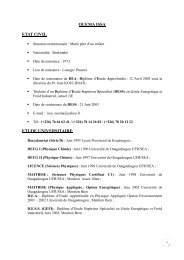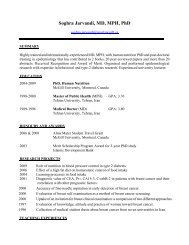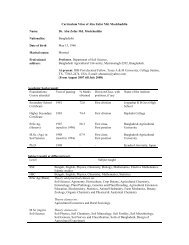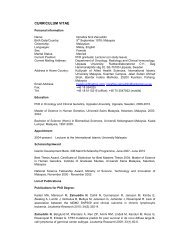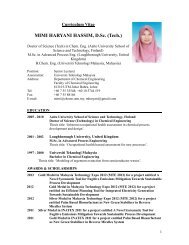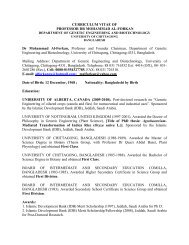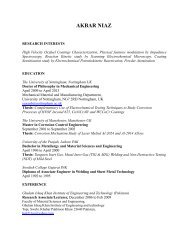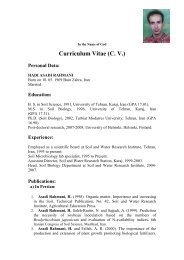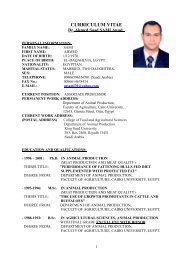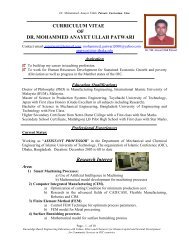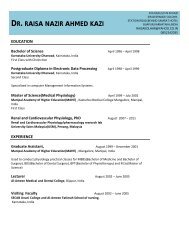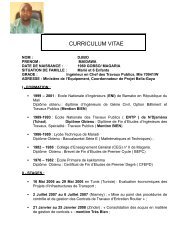- Page 2 and 3:
UNESCO ReportEngineering:IssuesChal
- Page 4:
This landmark report on engineering
- Page 7 and 8:
Executive SummaryAn agenda for engi
- Page 9 and 10:
ENGINEERING: ISSUES CHALLENGES AND
- Page 11 and 12:
ENGINEERING: ISSUES CHALLENGES AND
- Page 13 and 14:
ENGINEERING: ISSUES CHALLENGES AND
- Page 15 and 16:
Introductionto the Report
- Page 17:
INTRODUCTION© GFDL - Wikimedia - L
- Page 20 and 21:
ENGINEERING: ISSUES CHALLENGES AND
- Page 22 and 23:
1What is Engineering?
- Page 24 and 25:
WHAT IS ENGINEERING?and awareness o
- Page 26 and 27:
WHAT IS ENGINEERING?1.2 Engineers,
- Page 28 and 29:
2Engineering andHuman Development
- Page 30 and 31:
ENGINEERING AND HUMAN DEVELOPMENTth
- Page 32 and 33:
ENGINEERING AND HUMAN DEVELOPMENTwi
- Page 34 and 35:
ENGINEERING AND HUMAN DEVELOPMENTin
- Page 36 and 37:
ENGINEERING AND HUMAN DEVELOPMENTMo
- Page 38 and 39:
ENGINEERING AND HUMAN DEVELOPMENT2.
- Page 40 and 41:
ENGINEERING AND HUMAN DEVELOPMENTre
- Page 42 and 43:
ENGINEERING AND HUMAN DEVELOPMENT2.
- Page 44 and 45:
ENGINEERING AND HUMAN DEVELOPMENTa
- Page 46 and 47:
ENGINEERING AND HUMAN DEVELOPMENTIn
- Page 48 and 49:
ENGINEERING AND HUMAN DEVELOPMENTTh
- Page 50 and 51:
ENGINEERING AND HUMAN DEVELOPMENTke
- Page 52 and 53:
3Engineering:Emerging Issues and Ch
- Page 54 and 55:
ENGINEERING: EMERGING ISSUES AND CH
- Page 56 and 57:
ENGINEERING: EMERGING ISSUES AND CH
- Page 58 and 59:
ENGINEERING: EMERGING ISSUES AND CH
- Page 60 and 61:
ENGINEERING: EMERGING ISSUES AND CH
- Page 62 and 63:
ENGINEERING: EMERGING ISSUES AND CH
- Page 64 and 65:
ENGINEERING: EMERGING ISSUES AND CH
- Page 66 and 67:
ENGINEERING: EMERGING ISSUES AND CH
- Page 68 and 69:
ENGINEERING: ISSUES CHALLENGES AND
- Page 70 and 71:
ENGINEERING: ISSUES CHALLENGES AND
- Page 72 and 73:
ENGINEERING: ISSUES CHALLENGES AND
- Page 74 and 75:
ENGINEERING: ISSUES CHALLENGES AND
- Page 76 and 77:
ENGINEERING: ISSUES CHALLENGES AND
- Page 78 and 79:
ENGINEERING: ISSUES CHALLENGES AND
- Page 80 and 81:
ENGINEERING: ISSUES CHALLENGES AND
- Page 82 and 83:
ENGINEERING: ISSUES CHALLENGES AND
- Page 84 and 85:
ENGINEERING: ISSUES CHALLENGES AND
- Page 86 and 87:
ENGINEERING: ISSUES CHALLENGES AND
- Page 88 and 89:
ENGINEERING: ISSUES CHALLENGES AND
- Page 90 and 91:
ENGINEERING: ISSUES CHALLENGES AND
- Page 92 and 93:
ENGINEERING: ISSUES CHALLENGES AND
- Page 94 and 95:
ENGINEERING: ISSUES CHALLENGES AND
- Page 96 and 97:
ENGINEERING: ISSUES CHALLENGES AND
- Page 98 and 99:
ENGINEERING: ISSUES CHALLENGES AND
- Page 100 and 101:
ENGINEERING: ISSUES CHALLENGES AND
- Page 102 and 103:
ENGINEERING: ISSUES CHALLENGES AND
- Page 104 and 105:
ENGINEERING: ISSUES CHALLENGES AND
- Page 106 and 107:
ENGINEERING: ISSUES CHALLENGES AND
- Page 108 and 109:
ENGINEERING: ISSUES CHALLENGES AND
- Page 110 and 111:
ENGINEERING: ISSUES CHALLENGES AND
- Page 112 and 113:
ENGINEERING: ISSUES CHALLENGES AND
- Page 114 and 115:
ENGINEERING: ISSUES CHALLENGES AND
- Page 116 and 117:
ENGINEERING: ISSUES CHALLENGES AND
- Page 118 and 119:
ENGINEERING: ISSUES CHALLENGES AND
- Page 120 and 121:
ENGINEERING: ISSUES CHALLENGES AND
- Page 122 and 123:
ENGINEERING: ISSUES CHALLENGES AND
- Page 124 and 125:
ENGINEERING: ISSUES CHALLENGES AND
- Page 126 and 127:
ENGINEERING: ISSUES CHALLENGES AND
- Page 128 and 129:
ENGINEERING: ISSUES CHALLENGES AND
- Page 130 and 131:
ENGINEERING: ISSUES CHALLENGES AND
- Page 132 and 133:
ENGINEERING: ISSUES CHALLENGES AND
- Page 134 and 135:
ENGINEERING: ISSUES CHALLENGES AND
- Page 136 and 137:
ENGINEERING: ISSUES CHALLENGES AND
- Page 138 and 139:
ENGINEERING: ISSUES CHALLENGES AND
- Page 140 and 141:
ENGINEERING: ISSUES CHALLENGES AND
- Page 142 and 143:
ENGINEERING: ISSUES CHALLENGES AND
- Page 144 and 145:
ENGINEERING: ISSUES CHALLENGES AND
- Page 146 and 147:
ENGINEERING: ISSUES CHALLENGES AND
- Page 148 and 149:
ENGINEERING: ISSUES CHALLENGES AND
- Page 150 and 151:
ENGINEERING: ISSUES CHALLENGES AND
- Page 152 and 153:
ENGINEERING: ISSUES CHALLENGES AND
- Page 154 and 155:
ENGINEERING: ISSUES CHALLENGES AND
- Page 156 and 157:
ENGINEERING: ISSUES CHALLENGES AND
- Page 158 and 159:
ENGINEERING: ISSUES CHALLENGES AND
- Page 160 and 161:
ENGINEERING: ISSUES CHALLENGES AND
- Page 162 and 163:
ENGINEERING: ISSUES CHALLENGES AND
- Page 164 and 165:
ENGINEERING: ISSUES CHALLENGES AND
- Page 166 and 167:
ENGINEERING: ISSUES CHALLENGES AND
- Page 168 and 169:
ENGINEERING: ISSUES CHALLENGES AND
- Page 170 and 171:
ENGINEERING: ISSUES CHALLENGES AND
- Page 172 and 173:
ENGINEERING: ISSUES CHALLENGES AND
- Page 174 and 175:
ENGINEERING: ISSUES CHALLENGES AND
- Page 176 and 177:
ENGINEERING: ISSUES CHALLENGES AND
- Page 178 and 179:
ENGINEERING: ISSUES CHALLENGES AND
- Page 180 and 181:
ENGINEERING: ISSUES CHALLENGES AND
- Page 182 and 183:
ENGINEERING: ISSUES CHALLENGES AND
- Page 184 and 185:
ENGINEERING: ISSUES CHALLENGES AND
- Page 186 and 187:
ENGINEERING: ISSUES CHALLENGES AND
- Page 188 and 189:
ENGINEERING: ISSUES CHALLENGES AND
- Page 190 and 191:
ENGINEERING: ISSUES CHALLENGES AND
- Page 192 and 193:
ENGINEERING: ISSUES CHALLENGES AND
- Page 194 and 195:
ENGINEERING: ISSUES CHALLENGES AND
- Page 196 and 197:
ENGINEERING: ISSUES CHALLENGES AND
- Page 198 and 199:
ENGINEERING: ISSUES CHALLENGES AND
- Page 200 and 201:
ENGINEERING: ISSUES CHALLENGES AND
- Page 202 and 203:
5Engineering around the world
- Page 204 and 205:
ENGINEERING AROUND THE WORLDnationa
- Page 206 and 207:
ENGINEERING AROUND THE WORLDwere ta
- Page 208 and 209:
ENGINEERING AROUND THE WORLDare nee
- Page 210 and 211:
ENGINEERING AROUND THE WORLD5.3Coun
- Page 212 and 213:
ENGINEERING AROUND THE WORLDand res
- Page 214 and 215:
ENGINEERING AROUND THE WORLDof addi
- Page 216 and 217:
ENGINEERING AROUND THE WORLDevolvin
- Page 218 and 219:
ENGINEERING AROUND THE WORLD■■
- Page 220 and 221:
ENGINEERING AROUND THE WORLDdissati
- Page 222 and 223:
ENGINEERING AROUND THE WORLDing tec
- Page 224 and 225:
ENGINEERING AROUND THE WORLDFosteri
- Page 226 and 227:
ENGINEERING AROUND THE WORLDneers a
- Page 228 and 229:
ENGINEERING AROUND THE WORLDGerman
- Page 230 and 231:
ENGINEERING AROUND THE WORLDTable 1
- Page 232 and 233:
ENGINEERING AROUND THE WORLDAfter t
- Page 234 and 235:
ENGINEERING AROUND THE WORLDence, e
- Page 236 and 237:
ENGINEERING AROUND THE WORLD■ Pro
- Page 238 and 239:
ENGINEERING AROUND THE WORLDBrazilL
- Page 240 and 241:
ENGINEERING AROUND THE WORLDAs the
- Page 242 and 243:
ENGINEERING AROUND THE WORLDnology-
- Page 244 and 245:
6Engineering for Development:Applic
- Page 246 and 247:
ENGINEERING FOR DEVELOPMENT: APPLIC
- Page 248 and 249: ENGINEERING FOR DEVELOPMENT: APPLIC
- Page 250 and 251: ENGINEERING FOR DEVELOPMENT: APPLIC
- Page 252 and 253: ENGINEERING FOR DEVELOPMENT: APPLIC
- Page 254 and 255: ENGINEERING FOR DEVELOPMENT: APPLIC
- Page 256 and 257: ENGINEERING FOR DEVELOPMENT: APPLIC
- Page 258 and 259: ENGINEERING FOR DEVELOPMENT: APPLIC
- Page 260 and 261: ENGINEERING FOR DEVELOPMENT: APPLIC
- Page 262 and 263: ENGINEERING FOR DEVELOPMENT: APPLIC
- Page 264 and 265: ENGINEERING FOR DEVELOPMENT: APPLIC
- Page 266 and 267: ENGINEERING FOR DEVELOPMENT: APPLIC
- Page 268 and 269: ENGINEERING FOR DEVELOPMENT: APPLIC
- Page 270 and 271: ENGINEERING FOR DEVELOPMENT: APPLIC
- Page 272 and 273: ENGINEERING FOR DEVELOPMENT: APPLIC
- Page 274 and 275: ENGINEERING FOR DEVELOPMENT: APPLIC
- Page 276 and 277: ENGINEERING FOR DEVELOPMENT: APPLIC
- Page 278 and 279: ENGINEERING FOR DEVELOPMENT: APPLIC
- Page 280 and 281: ENGINEERING FOR DEVELOPMENT: APPLIC
- Page 282 and 283: ENGINEERING FOR DEVELOPMENT: APPLIC
- Page 284 and 285: ENGINEERING FOR DEVELOPMENT: APPLIC
- Page 286 and 287: ENGINEERING FOR DEVELOPMENT: APPLIC
- Page 288 and 289: ENGINEERING FOR DEVELOPMENT: APPLIC
- Page 290 and 291: ENGINEERING FOR DEVELOPMENT: APPLIC
- Page 292 and 293: ENGINEERING FOR DEVELOPMENT: APPLIC
- Page 294 and 295: ENGINEERING FOR DEVELOPMENT: APPLIC
- Page 296 and 297: ENGINEERING FOR DEVELOPMENT: APPLIC
- Page 300 and 301: ENGINEERING FOR DEVELOPMENT: APPLIC
- Page 302 and 303: ENGINEERING FOR DEVELOPMENT: APPLIC
- Page 304 and 305: 7Engineering Capacity:Education, Tr
- Page 306 and 307: ENGINEERING CAPACITY: EDUCATION, TR
- Page 308 and 309: ENGINEERING CAPACITY: EDUCATION, TR
- Page 310 and 311: ENGINEERING CAPACITY: EDUCATION, TR
- Page 312 and 313: ENGINEERING CAPACITY: EDUCATION, TR
- Page 314 and 315: ENGINEERING CAPACITY: EDUCATION, TR
- Page 316 and 317: ENGINEERING CAPACITY: EDUCATION, TR
- Page 318 and 319: ENGINEERING CAPACITY: EDUCATION, TR
- Page 320 and 321: ENGINEERING CAPACITY: EDUCATION, TR
- Page 322 and 323: ENGINEERING CAPACITY: EDUCATION, TR
- Page 324 and 325: ENGINEERING CAPACITY: EDUCATION, TR
- Page 326 and 327: ENGINEERING CAPACITY: EDUCATION, TR
- Page 328 and 329: ENGINEERING CAPACITY: EDUCATION, TR
- Page 330 and 331: ENGINEERING CAPACITY: EDUCATION, TR
- Page 332 and 333: ENGINEERING CAPACITY: EDUCATION, TR
- Page 334 and 335: ENGINEERING CAPACITY: EDUCATION, TR
- Page 336 and 337: ENGINEERING CAPACITY: EDUCATION, TR
- Page 338 and 339: ENGINEERING CAPACITY: EDUCATION, TR
- Page 340 and 341: ENGINEERING CAPACITY: EDUCATION, TR
- Page 342 and 343: ENGINEERING CAPACITY: EDUCATION, TR
- Page 344 and 345: ENGINEERING CAPACITY: EDUCATION, TR
- Page 346 and 347: ENGINEERING CAPACITY: EDUCATION, TR
- Page 348 and 349:
ENGINEERING CAPACITY: EDUCATION, TR
- Page 350 and 351:
ENGINEERING CAPACITY: EDUCATION, TR
- Page 352 and 353:
ENGINEERING CAPACITY: EDUCATION, TR
- Page 354 and 355:
ENGINEERING CAPACITY: EDUCATION, TR
- Page 356 and 357:
ENGINEERING CAPACITY: EDUCATION, TR
- Page 358 and 359:
ENGINEERING CAPACITY: EDUCATION, TR
- Page 360 and 361:
ENGINEERING CAPACITY: EDUCATION, TR
- Page 362 and 363:
ENGINEERING CAPACITY: EDUCATION, TR
- Page 364 and 365:
ENGINEERING: ISSUES CHALLENGES AND
- Page 366 and 367:
ENGINEERING: ISSUES CHALLENGES AND
- Page 368 and 369:
APPENDICES9.1Engineering at UNESCO
- Page 370 and 371:
APPENDICES9.2Biographies of Contrib
- Page 372 and 373:
APPENDICESopment of software for in
- Page 374 and 375:
APPENDICESwas President of the Euro
- Page 376 and 377:
APPENDICESous career in higher educ
- Page 378 and 379:
APPENDICES2002 and has led the deve
- Page 380 and 381:
APPENDICESity engineering, and form
- Page 382 and 383:
APPENDICESKevin WallDr Kevin Wall i
- Page 384 and 385:
APPENDICES9.3List of acronyms abbre
- Page 386 and 387:
APPENDICESIAAMRHIACETICCICEICIDICSU
- Page 388 and 389:
APPENDICESUNCSTDUNCTADUNDPUNEPUNESC
- Page 390 and 391:
APPENDICES212, 213, 214, 215, 217,



